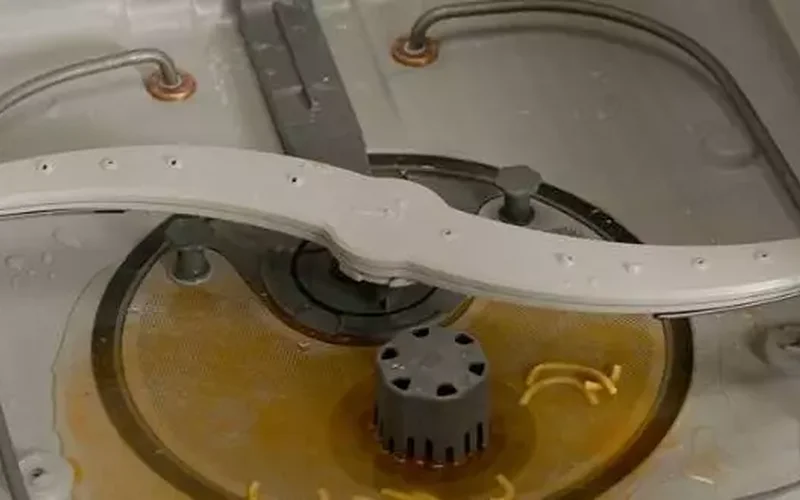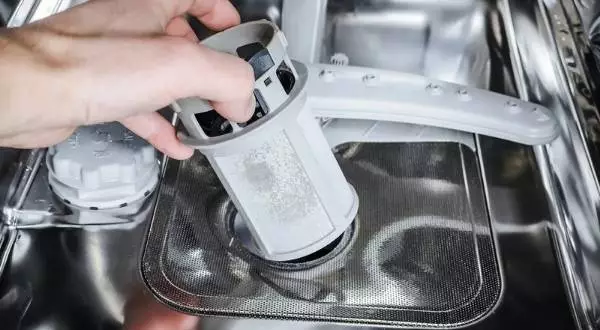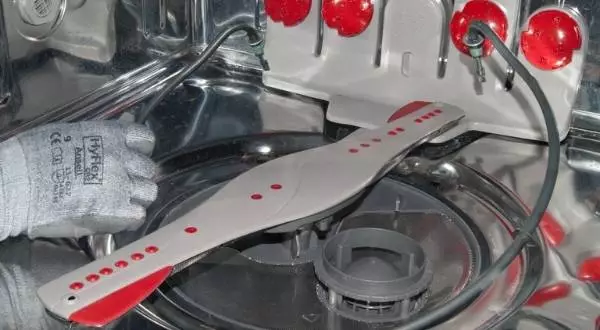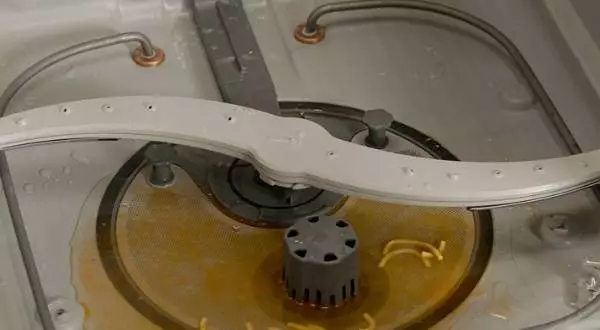25 Most Common Cause Of A Dishwasher Leaking
We may earn affiliate fees for purchases using our links (at no additional cost to you).
If your dishwasher is leaking, it can be a nuisance. Leaking water can cause damage to your countertops and floors. It also increases the risk of injury if you are standing near the dishwasher when it leaks.

If your dishwasher suddenly starts to leak, check these 25 most common causes of a dishwasher leaking before calling for help.
- Clogged Dishwasher Filter
- Door Seal Leaking
- Inadequate Water Supply
- Overloaded Dishwasher
- Improper Loading
- Worn Out Appliance Parts
- Inadequate Ventilation for Dryer Vents
- Corroded Water Inlet Valve and Hose Connections
- Pump Seal Leaking
- Inadequate Drain Line Air Gap Height
- Exposed Dishwasher Heater Element Wire
- Clogged Vent Pipe
- Difficult to Turn Knobs
- Leaking Spray Arms
- Inadequate Water Temperature
- Unlevel Dishwasher
- Leaking Water Valve
- Damaged Hose Clamps
- Inadequate Dishwasher Drain Line Capacity
- Inadequate Dishwasher Vent Line Capacity
- Dishwasher Valve Stem Drips
- Dishwasher Not Draining Properly
- Inadequate or Non-Existent Seal Between Dishwasher & Countertop
- Leaking Drain Hose or Filter Screens
- Detergent Accumulation
Now we’re going to go through each of these steps and explain what you should do if your dishwasher is leaking for each problem.
1. Clogged Dishwasher Filter
The filter is usually located in the bottom of your dishwasher, just inside the door opening. This filter has multiple holes to allow water to drain out of the machine.

If this area becomes blocked with food particles or other debris, they can cause water to back up into your dishwasher through the drain hose.
2. Door Seal Leaking
The door seal is a rubber gasket that forms a tight seal when you close the dishwasher’s door.
A faulty or damaged door seal allows water to escape from your dishwasher and pool on the floor around your machine.
If this continues, it can damage wood floors in addition to causing damage to surrounding countertops and cabinets.
3. Inadequate Water Supply
You must always make sure you have an adequate supply of water for your dishwasher to operate properly.
An inadequate flow of water can cause poor performance, which often results in leaks.
Dishwashers need at least 20 psi (pounds per square inch) of water pressure to function properly.
For the best performance, your water pressure should be between 40 and 120 psi.
4. Overloaded Dishwasher
If you stuff a dishwasher full of dirty dishes, you put excess pressure on all of its components.
This increased stress can cause vibrations that damage seals and hoses over time, eventually leading to leaks from the dishwasher.
You will have to closely monitor how many dishes you load into your machine each time you run it for the best results.
5. Improper Loading
Improper loading can damage seals and hoses on your dishwasher. Never overload a dishwasher with too many dishes or heavy items that could put pressure against seal joints on the door.
Instead, you should use the right utensils and place heavy items around your dishes to balance your load as much as possible.
6. Worn Out Appliance Parts
More than a third of all dishwashers have leaks by the time they are four years old. Many times, these leaks can be traced back to worn out dishwasher parts.
For example, the seal around your dishwasher door usually wears out after three to five years of use. This often requires you to replace it or tighten loose screws on the door to prevent water leaks.
7. Inadequate Ventilation for Dryer Vents
If you place your dryer too close to your dishwasher, the lint from your dryer can join with other expelled air to block airflow.
This causes moisture to form in your dishwasher, which can cause leaks or damage its internal components.
8. Corroded Water Inlet Valve and Hose Connections
Corroded water valve connections are a common cause of dishwasher leaks. The water inlet valves are located on your machine underneath the lower spray arm.
These valves have hose connectors that supply water into the machine for rinsing dishes, cleaning out food particles and supplying steam heat to loosen stubborn stains during cycle runs.
When these hoses corrode, they need replacement before you experience leaking problems throughout your home.
9. Pump Seal Leaking
The pump seal is responsible for draining water from your dishwasher once the cycle is complete.
If this seal fails, it allows water to build up in the machine’s cavity and eventually leak out.
You should monitor your dishwasher after each cycle for long periods of time.
This allows you to catch problems like a leaking seal before they cause extensive damage in your home.
10. Inadequate Drain Line Air Gap Height
If your drain line air gap is too low or too close to the sink, it could result in water seeping out onto your kitchen floor until you diagnose and repair the problem.
11. Exposed Dishwasher Heater element Wire
If your dishwasher heater element wire is exposed due to rusting, the electricity passing through it could cause corrosion that eventually leads to leaks.

This problem can be avoided by wrapping exposed wires with electrical tape and inspecting them annually for signs of damage.
12. Clogged Vent Pipe
A clogged vent pipe can cause water to build up inside your dishwasher.
This problem tends to occur due to grease and food particles that prevent air from flowing freely through the machine’s vents.
You should inspect your dishwasher’s vent line each time you clean it for debris and remove any obstructions with a stiff brush.
13. Difficult to Turn Knobs
If your dishwasher’s knobs are difficult to turn, they may require replacement or lubrication.
Over time, dishwasher knobs can get stiff from exposure to moisture and harsh cleaners.
In extreme cases, these problems can cause your dishwasher not to start when it is turned on.
14. Leaking Spray Arms
If your dishwasher’s spray arms leak, they may be cracked or corroded. Spray arm assemblies usually need to be replaced every three years, although the exact length of time will vary depending on how often you use your dishwasher and scouring pad quality.
15. Inadequate Water Temperature
If you run your dishwasher at lower temperatures than normal, it can cause redeposit problems.
Redeposit is the process of food particles being released from your dishes and landing on clean surfaces during cycles.
This problem tends to occur when you do not pre-wash dishes before you place them in the machine.
Generally, water temperature should be set to 125 degrees Fahrenheit for normal dishwashing and 155 degrees Fahrenheit for sanitizing dishes.
16. Unlevel Dishwasher
If your dishwasher is not level, it can cause water to spill from its drain or filter.
This problem should be remedied by placing a shim between the dishwasher’s feet and the floor to make it level.
17. Leaking Water Valve
Your dishwasher’s water inlet valve is critical to its operation because it supplies hot water into your machine for detergent activation and cleaning.
Leaking valves need replacement before they cause major damage to your home.
18. Damaged Hose Clamps
Hose clamps secure dishwasher hoses to the water valves and drain line. Damaged hose clamps need replacement as they can wear out over time.
19. Inadequate Dishwasher Drain Line Capacity
Your dishwasher’s drain line should be at least 1/3 the diameter of your garbage disposer’s drain line for proper drainage.
This problem affects the ability of your dishwasher to drain properly, which causes water seepage throughout your home.
20. Inadequate Dishwasher Vent Line Capacity
Your dishwasher vent line should be long enough to ensure enough airflow from it reaches all parts of your kitchen.
If there are dead zones in your kitchen where airflow is impeded, steam can build up in these areas, which can cause water seepage.
21. Dishwasher Valve Stem Drips
A dripping valve stem indicates a problem with one of three components: the filter screen (if equipped), anti-siphon device, or pressure regulator.
To determine which component is causing the leak, turn off the supply water and remove both parts from the valve stem.
If turning off supply water stops the leak, the problem is with your pressure regulator.
If turning off supply water does not stop the leak, the problem is with your anti-siphon device or filter screen.
22. Dishwasher Not Draining Properly
If your dishwasher is not draining properly, check for clogs in its drain line and air gap. Debris can accumulate in these areas and cause water seepage throughout your home when the machine fails to drain properly at cycle’s end.

23. Inadequate or Non-Existent Seal Between Dishwasher & Countertop
An inadequate seal allows water to seep under the machine and cause further damage. A non-existent seal can allow water to gather between the dishwasher’s base and countertop, which causes discoloration in your grout work.
24. Leaking Drain Hose or Filter Screens
If your hose or filter screens are damaged in any way, they can allow drain water to escape and cause water seepage throughout your home. Check both components for signs of wear.
25. Detergent Accumulation
Detergent buildup in dishwashers occurs when it is not thoroughly rinsed down the drain after each cycle. To prevent this problem, make sure to scrape your dishes before loading them into the machine.
Final Thoughts
Leaking dishwashers are a problem that plagues the lives of people all over the world. They occur most often at home.
However, above we listed 25 common causes of leaking dishwashers. If there is still a problem, then it is time for professional help.